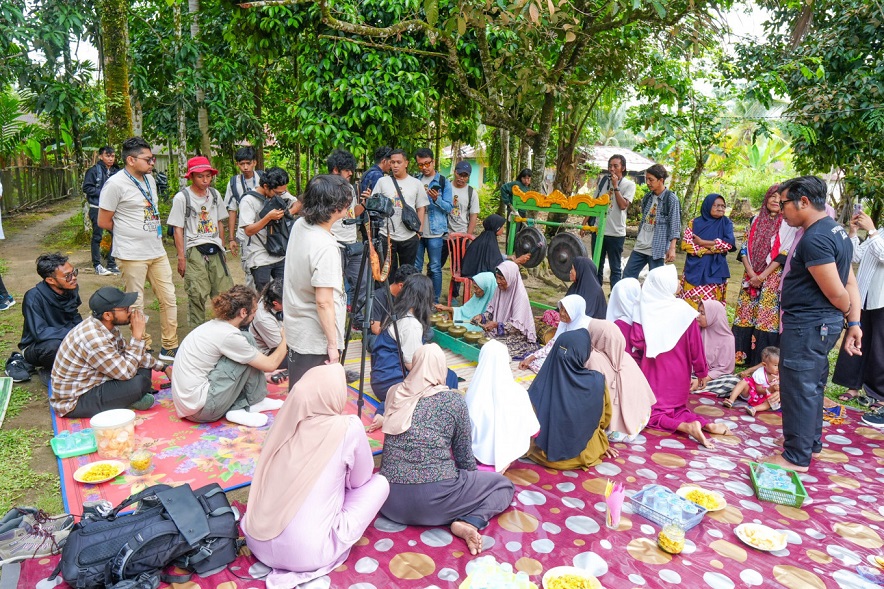News
Collaboration of Indonesian & Global Cultural Practitioners to Advance Indonesian Culture
Front Row (The Jakarta Post) August 15, 2024 Cultural Advancement Residency Program 2024 participants. (Education, Culture, Research, and Technology Ministry)
Cultural Advancement Residency Program 2024 participants. (Education, Culture, Research, and Technology Ministry)
The Education, Culture, Research, and Technology Ministry, following the mandate of Law No. 5/2017 on cultural advancement, is implementing the 2024 Cultural Advancement Residency Program.
The initiative supports cultural practitioners and communities, both domestic and international, by involving experts in various fields located at three key sites of cultural advancement: Tari Topeng Losari in Cirebon, West Java; “Pantun” Musicalization and Oral Tradition in Pekanbaru, Riau; and Traditional Sport Jemparingan in Yogyakarta.
Participants to the program come from countries such as Australia, Mexico, Italy, India, Canada, the United States, the Netherlands, Malaysia, Colombia, Ecuador, Thailand, Egypt, the Philippines, Jordan and Poland. These participants will collaborate with 30 selected Indonesian cultural practitioners, residing together at the three designated sites, and working alongside experts in each field.
Education, Culture, Research, and Technology Ministry Director-General of Culture Hilmar Farid emphasized that this collaboration served as a form of cultural diplomacy for Indonesia while also expanding the network of Indonesian cultural practitioners internationally.
“We hope that the participants can collaborate to create new works that not only enhance their capacity in advancing Indonesian culture but also expand our cultural network globally. The continuity of this program is crucial, considering its long-term benefits for Indonesia,” he said.
The 2024 Residency Program builds on the previous “Learning to the Maestro” program, initially limited to the arts. This new program has expanded to include 10 objects of cultural advancement, aiming to strengthen cultural promotion across these areas and focusing on cultural diplomacy on an international level.
Education, Culture, Research, and Technology Ministry Culture Directorate-General's Cultural Human Resources and Cultural Institutions Empowerment Director Restu Gunawan highlighted the importance of fostering cultural advancement objects (OPK) in fulfilling the mandate of Law No. 5/2017.
“We hope this residency program serves as a means to preserve Indonesian culture while also introducing it to younger generations as a form of cultural practitioner development,” he stated.
In the second week, participants began to immerse themselves in the arts and traditions in each location. Aryo Hall, 27, from Australia expressed enthusiasm about learning the diverse cultural arts of Indonesia. A musician of Yogyakarta-Australian descent, Aryo had already studied Javanese, Sundanese and Balinese gamelan at the Indonesian Institute of the Arts (ISI) Yogyakarta. This time, he hopes to explore music from Riau.
“Riau’s music is very different from Javanese music. The calempong instrument is fascinating, with life behind its music, and deserves wider recognition,” Aryo said.
Participants also explored the oral tradition in Kampar, Riau, known as koba or bokoba, a storytelling tradition performed through singing. Under the guidance of trainers like Salman Azis and Taslim bin Faham, participants will adapt oral pantun literature into music.
In Cirebon, participants are learning tari topeng Losari under the guidance of Nani Topeng Losari, a seventh-generation heir to this art form. In Yogyakarta, they are learning jemparingan (traditional archery), guided by the Jemparingan Langenastro community.
The program’s outcomes, including collaborative works developed by participants, will be showcased in a public performance at the Fatahillah Museum courtyard in Kota Tua Jakarta on Aug. 31, 2024.

